As Puzzle begins, we see Agnes vacuuming her house. She looks as dull and as dimly lit and as dusty as the house she’s vacuuming.
This is how you might expect a movie to begin if it’s going to be about the drudgery of being a neglected housewife. You might also anticipate a great deal of what’s ahead. You’ll brace yourself for scenes of domestic tensions; of a belligerent husband; of a concerned friend raising questions that Agnes brushes off in her fear, shame, and humility; of Agnes resisting temptations to pursue something—or someone—representing her own desires and potential.
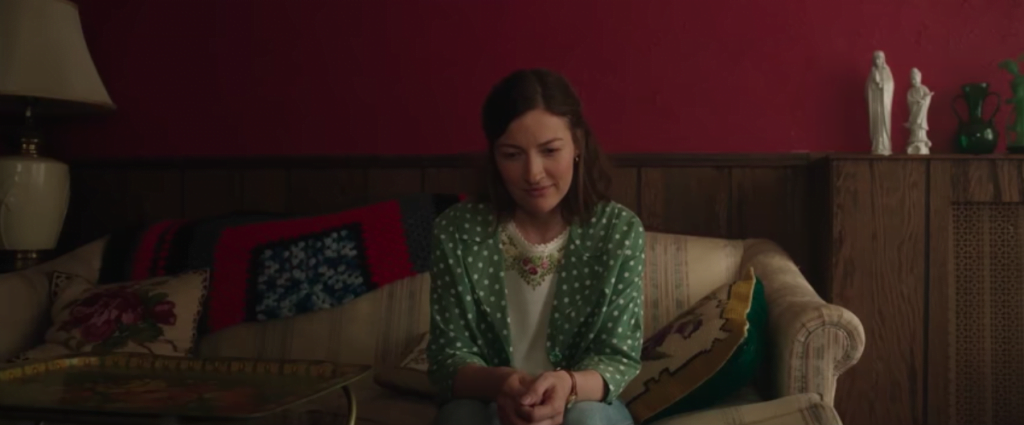
The fact that I’d heard the premise — “This is the story of a neglected housewife who discovers a passion for jigsaw puzzles and secretly slips away to pursue competitive puzzling” — did not help matters. I was ready for a whole lot of “been there, done that”:
- the woman’s secretive training behind the backs of her disapproving husband and children;
- the conventional development of a Mr. Miyagi/Karate Kid relationship with a genius;
- a training-for-competition montage;
- her family’s inevitable discovery of her secret life and passion;
- a sudden turn that threatens her ability to participate in the competition;
- a joyful rush when she finally breaks free of her family, or when they finally come around to supporting her, and she gets to compete anyway; and, of course,
- the suspenseful (but inevitable) tournament victory.
And, of course, the ‘Plain Jane’ appearance of our hero would dissolve so that she looks like a glamorous celebrity at the end — thank God!
I admit that I smelled these maddening cliches right away. These are tried-and-true crowdpleasing paces, but I’ve seen too many movies to find them interesting anymore. I started fast-forwarding through the movie in my mind.
But, fortunately, I was sitting in a theater and did not have a remote in my hand.
Puzzle may begin in a way that feels familiar and formulaic. And it does, in fact, include some of those unsurprising turns. But it is a much, much more rewarding experience than I expected.
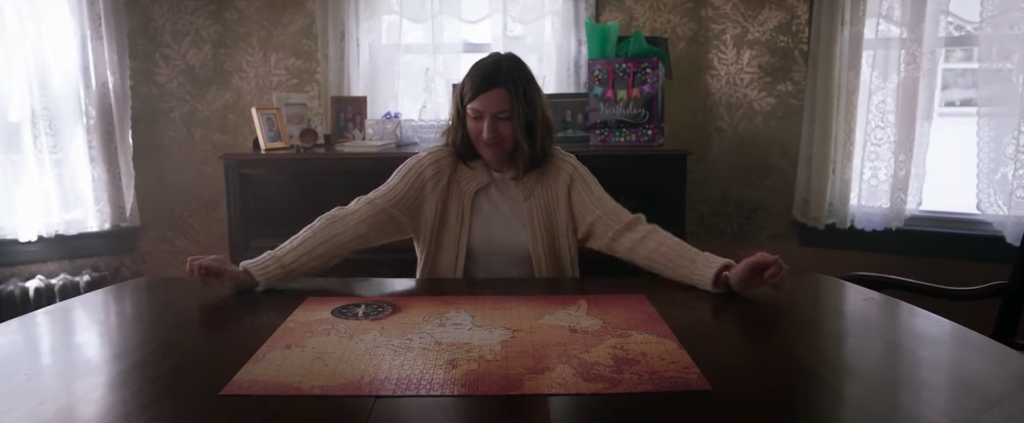
Heed this warning: Avoid the trailer at all costs. I can think of few previews that spoil more of a movie’s important turns than this one. Suffice it to say that, after that worrying start, almost every scene of Puzzle comes alive with small pleasures, big surprises, and exquisite subtleties of storytelling, performance, and cinematography.
Much of the credit is due, I suspect, to the writers.
IMDB lists Puzzle as Polly Mann’s first screenplay, but her co-writer Oren Moverman worked on such outstanding indie hits as Love & Mercy, The Messenger, and I’m Not There (with Todd Haynes). They’ve made Agnes and her jigsaw-genius mentor Robert into nuanced, believable, and complicated characters.
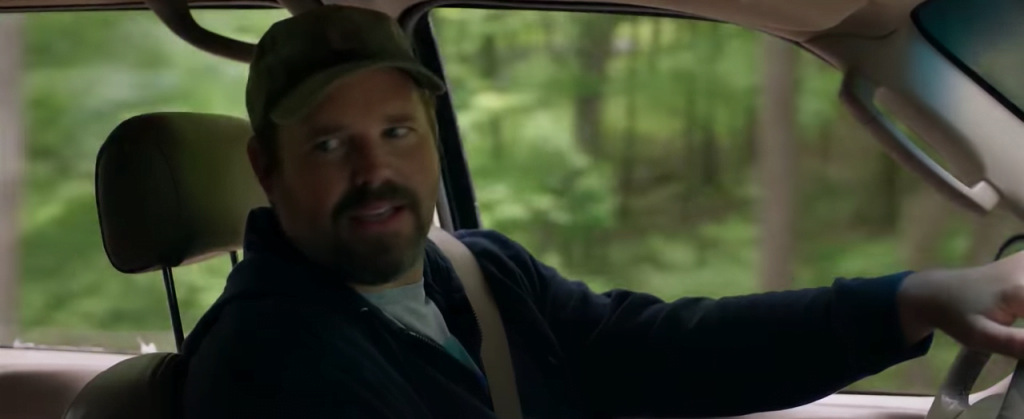
Perhaps most importantly, they’ve made her husband Louie into someone who is simultaneously overbearing, loving, naive, sympathetic, and frightening. It should have been easy to cheer for Agnes and to root for her to abandon her horrible husband for a romance with someone who really sees her. But Puzzle is not that movie. Mann and Overman chart a course that risks alienating the audience by committing to the complex humanity of its characters, and by refusing to support the lie that difficult marriages can be happily and blissfully abandoned.
That’s just one of the ways that Mann and Overment cleverly avoid the pitfalls of genre cliches. Most impressively, they devote very little time at all to puzzle competition events. Yes, we’re on our way toward heated puzzle matches. But get this: Agnes has no rival. We’re not given a villain to root against. In fact, we don’t even witness any culmination to an edge-of-your-seat championship round!
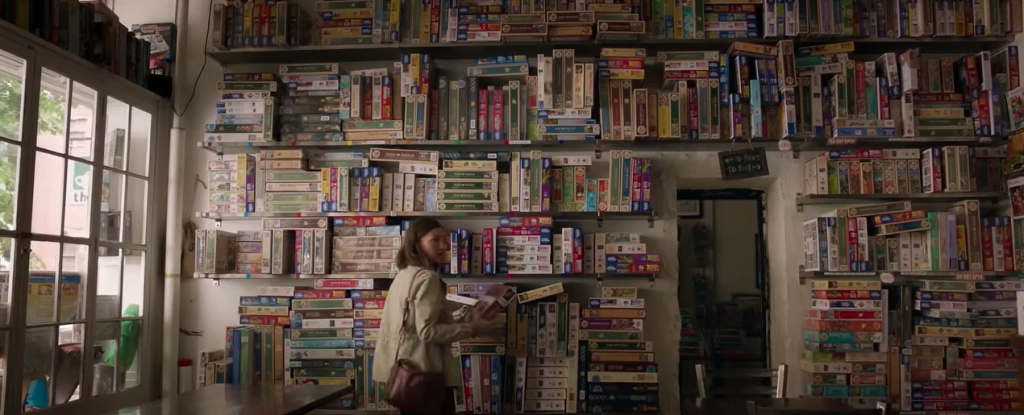
Instead, the film focuses on a tangle of messy relationships. I believe in Agnes, Louie, and their two sons—one of whom is escaping by way of college, the other hanging around home with clear eyes and, yes, a big heart. This family, flawed as it is, is a loving family. They disappoint each other. They give each other second and third chances. And they soldier on as a family even after explosive clashes. What a rare and marvelous thing to witness.
Don’t overlook the film’s treatment of the family’s faith, either. Louie and Agnes are Catholics, and that becomes an influential factor in Agnes’s moral struggles when her husband takes a harsh stand between her and meaningful engagement with the world beyond housework. Is her faith an avenue of freedom and salvation, or is it just one more cultural pressure restricting her to frustration?
Even more impressive, the film refuses to give the audience a clear conclusion of tragedy or triumph. It arrives at a messy but meaningful conclusion that is open to interpretation. For me, this was even more satisfying and thrilling than the summer’s stunt-driven Mission: Impossible movie.
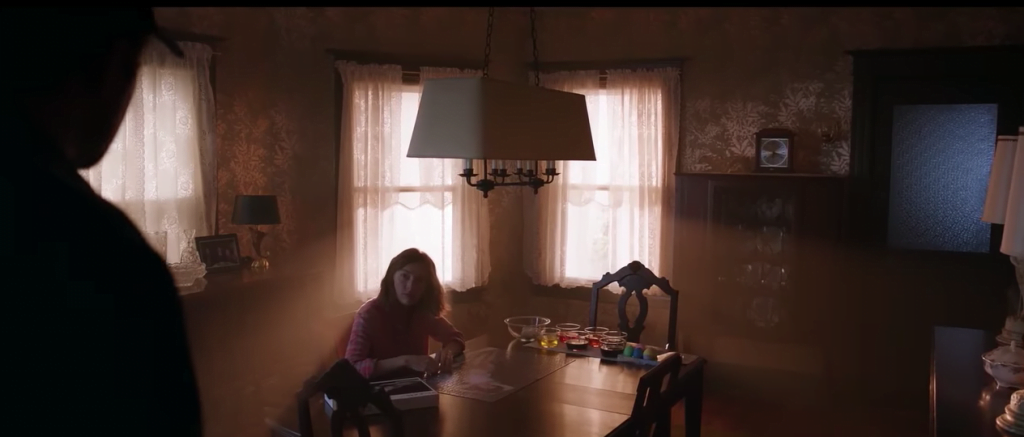
I also commend cinematographer Christopher Norr, who filmed Scott Derrickson’s masterful horror film Sinister, for infusing this film in sumptuous color and light. While it’s a script-based film, with most scenes being filmed matter-of-factly, it offers moments I wanted to live in for a while, radiant in ways that reminded me of Kieslowski’s Three Colors trilogy.
But I must, above all, celebrate what Puzzle‘s three leads achieve: an exquisite, discomforting, and fully human chemistry. As Agnes, Kelly Macdonald—an actress I would happily watch on a far more regular basis, worthy to be remembered for so much more than No Country for Old Men, Brave, and Gosford Park—shines in the lead. Her face is a powerfully expressive text conveying complicated emotions and thoughts, and representing hairpin turns of understanding and decision that are always convincing.
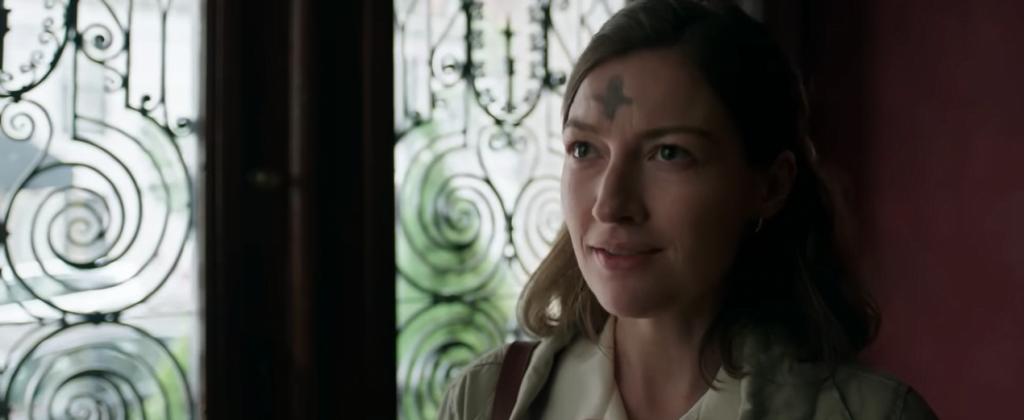
Irfan Khan (The Namesake, The Darjeeling Limited)—an actor who deserves so much more praise and glory than American audiences give him—turns unremarkable lines into surprising moments. I’d call this Oscar-worthy work in a supporting role.
David Denham has, in some respects, the most difficult job here. I’ve only known him as Pam’s aggravating boyfriend on The Office, but he makes Louie one of the most memorable big-screen fathers and husbands I’ve seen in recent years. Late in the film, I found myself rooting for him to make the right movies, change his heart, and redeem himself from past mistakes.
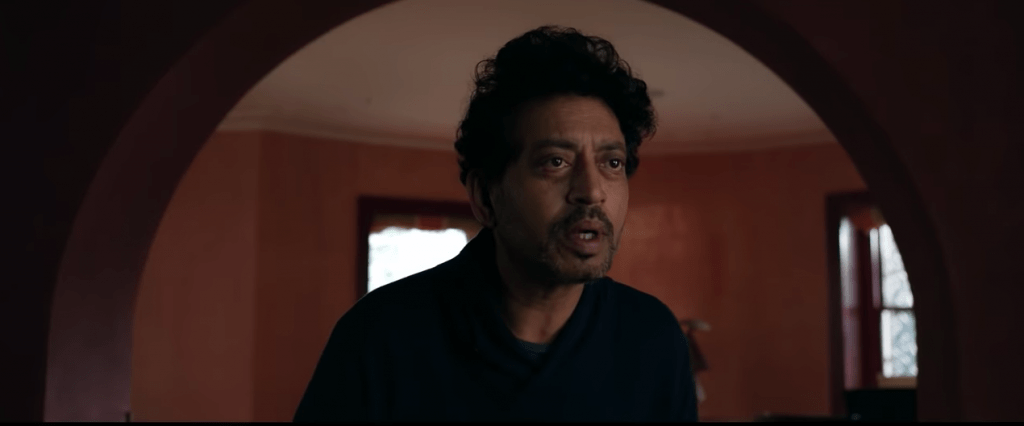
Puzzle, directed by Mark Turtletaub (a producer on that indie landmark Little Miss Sunshine), brings so many three-dimensional pieces together into a small, substantial, and intricate surprise — one that has stayed with me since I got more than I bargained for on an occasion of spur-of-the-moment, late-night moviegoing. (It makes me curious about Rompecabezas, the 2010 Argentine movie on which this film is based.)
So if you’re worried about being bored by a movie about jigsaw puzzles, or weary of films about the living hells experienced by housewives — I mean, come on, I know so many extraordinary stay-at-home moms who live rich and rewarding lives — let me encourage you to give Puzzle a try anyway.
I almost heeded my concerns and skipped it. And I’m so glad I didn’t.